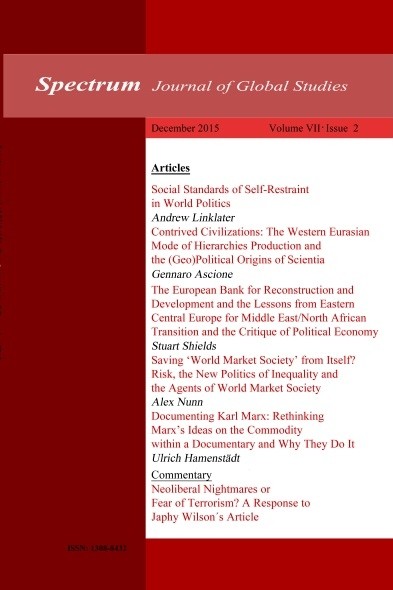Neoliberal Nightmares
Neoliberal Nightmares
Neoliberalism died in the financial crisis of 2008. But it has risen from the grave. This uncanny
persistence has coincided with an increased interest in gothic themes in the realms of popular culture
and critical political economy. This paper presents a psychoanalytic diagnosis of this unsettling
scenario. Gothic monsters are identified as symptoms of the Real of Capital as an abstract form of
domination. Neoliberalism is then theorised as a form of obsessional neurosis, which evolves through
its failed attempts to conceal the traumatic dimensions of the Real of Capital. This argument is
illustrated through the strange case of the celebrity development economist Jeffrey Sachs, and his
peculiar transformation from Dr Shock into Mr Aid. I conclude with some reflections on the
nightmarish phenomenon of zombie neoliberalism.
Keywords:
Neoliberal ideology, Spectres of Capital, Economics of Anxiety, Washington consensus Financial Crisis of 2008,
___
- Arthur, Christopher J. (2004) The New Dialectic and Marx’s Capital Boston: Brill.
- Calder Williams, Evan. (2011) Combined and Uneven Apocalypse Ropley: Zero.
- Cammack, Paul. (2004) ‘What the World Bank Means by Poverty Reduction and Why It Matters’ New Political Economy 9(2): 189-211.
- Chesterton, GK. (2003) ‘The Real Stab of the Story’, in Katherine Linehan (ed.) Robert Louis Stevenson, The Strange Case of Dr Jekyll and Mr Hyde: an Authoritative Text New York: Norton.
- Crouch, Colin. (2011) The Strange Non-Death of Neo-Liberalism Cambridge: Polity.
- Dean, Mitchell. (2014) ‘Rethinking neoliberalism’ Journal of Sociology 50(2): 150-163.
- Fine, Ben. (2008) ‘Zombieconomics: The Living Death of the Dismal Science in the Age of Neoliberalism’ (Paper for ESRC Neoliberalism Seminar, 01/04/2008).
- Fink, Bruce. (1995) The Lacanian Subject: Between Language and Jouissance Princeton: Princeton University Press.
- Fisher, Mark. (2013) ‘How to Kill a Zombie: Strategizing the End of Neoliberalism’ Open Democracy 18/07/2013 available at https://www.opendemocracy.net/mark-fisher/how-to-kill-zombiestrategizing-end-of-neoliberalism (accessed 08/01/2013).
- Godfrey, Richard, Gavin Jack and Campbell Jones. (2004) ‘Sucking, Bleeding, Breaking: On the Dialectics of Vampirism, Capital, and Time’ Culture and Organization 10(1): 25-36.
- Klein, Naomi. (2008) The Shock Doctrine New York: Picador.
- Leader, Darian. (2011) What is Madness? London: Penguin.
- Lipton, David and Jeffrey Sachs. (1992) ‘Prospects for Russia’s Economic Reforms’ Brookings Papers on Economic Activity.
- Mark, Karl. (1973) Grundrisse London: Pengui
- Perelman, Marcus. (2000) The Invention of Capitalism: Classical Political Economy and the Secret History of Primitive Accumulation Durham: Duke University Press.
- Polanyi, Karl. (1944) Origins of Our Time: The Great Transformation New York: Farrer and Rinehart.
- Postone, Moishe. (1993) Time, Labour, and Social Domination Cambridge: Cambridge University Press.
- Robinson, Joan. (1962) Economic Philosophy. London: Penguin.
- Sachs, Jeffrey. (2010) ‘Time to plan for Post-Keynesian era’ Financial Times 07/06/2010.
- Sachs, Jeffrey. (2011) The Price of Civilization. London: Random House.
- Sheppard Erik and Helga Leitner. (2010) ‘Quo vadis neoliberalism? The remaking of global capitalist governance after the Washington Consensus’ Geoforum 41: 185-194.
- Smith, Neil. (2008) ‘Comment: Neoliberalism: Dominant but Dead’ Focaal 51(1): 15.
- Starosta, Guido. (2014) Marx’s Capital, Method and Revolutionary Subjectivity (draft manuscript).
- Stevenson, Robert Louis. (2003) Curious Case of Dr Jekyll and Mr Hyde in Katherine Linehan (ed.) Robert Louis Stevenson, The Strange Case of Dr Jekyll and Mr Hyde: an Authoritative Text. New York: Norton.
- Taylor, Marcus. (2004) ‘Responding to neoliberalism in crisis: Discipline and empowerment in the World Bank’s new development agenda’, Research in Political Economy 21: 3-30
- Wilson, Japhy. (2011) ‘Colonising Space: The New Economic Geography in Theory and Practice’ New Political Economy 16(3): 373-397.
- Wilson, Japhy. (2014a) ‘The Shock of the Real: the Neoliberal Neurosis in the Life and Times of Jeffrey Sachs’ Antipode 46(1): 301-321.
- Wilson, Japhy. (2014b) Jeffrey Sachs: The Strange Case of Dr Shock and Mr Aid. London: Verso.
- Wilson, Japhy. (2014c) ‘Fantasy Machine: Philanthrocapitalism as an Ideological Formation’ Third World Quarterly 35(7): 1144-1161.
- Wilson: Japhy. (2015) ‘The Village that Turned to Gold: A Parable of Philanthrocapitalism’ Development and Change (forthcoming).
- Yates, Michael D. (2011) ‘Occupy Wall Street and the Celebrity Economists’, Monthly Review, 23/10/2011 http://monthlyreview.org/press/news/michael-d-yates-on-occupy-wall-streetand-the-celebrity-economists/ (accessed 11/01/2015).
- Žižek, Slavoj. (1989) The Sublime Object of Ideology. London: Verso.
- Žižek, Slavoj. (1997) The Plague of Fantasies. London: Verso.
- Žižek, Slavoj. (2008a) For They Know Not What They Do: Enjoyment as a Political Factor. London: Verso (second edition).
- Žižek, Slavoj, (2008b) Violence. London: Profile.
- Žižek, Slavoj. (2011) ‘Actual Politics’ Theory and Event 14(4) (online supplement)
- ISSN: 1308-8432
- Başlangıç: 2009
- Yayıncı: Dış Politika ve Uluslararası İlişkiler Derneği
Sayıdaki Diğer Makaleler
After the crisis: global capitalism and the critique of political economy
Hegemony in the Making: TÜSİAD’s Hegemonic Role in the Context of Turkey’s EU Membership Process
What International Organizations Do, and Why They Do It
Class struggle in times of crisis: conceptualising agency of resistance
